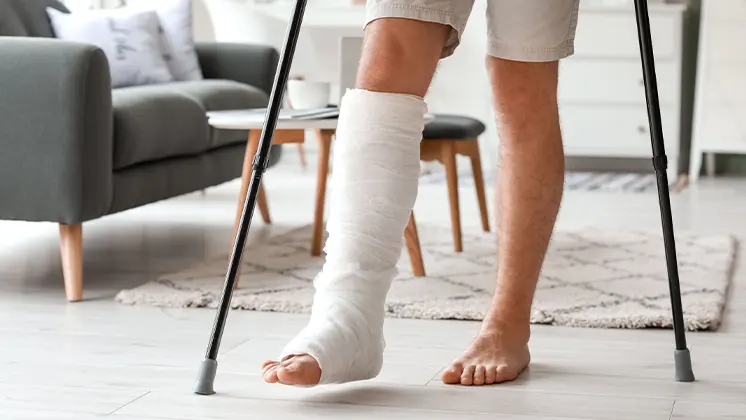Fractures and Broken Bones and Virginia Workers’ Compensation Settlements

Suffering a broken bone on the job can be scary and stressful. You may be worried about covering medical bills, lost wages, and getting back to work. The experienced personal injury attorneys at Slominski Law are here to help Virginia workers understand their rights and file successful workers’ compensation claims after bone fractures.
An Overview of Workers’ Compensation Bone Injury Claims
If you suffer any type of bone fracture while performing job duties, you may have a valid claim for workers’ compensation benefits in Virginia. Workers’ compensation provides wage replacement benefits, payment of medical bills, and vocational rehabilitation services to those injured while working. To have a valid claim after a workplace bone injury, you must show that:
- The injury occurred because of and while performing job duties
- The fracture or break resulted from an accident, trauma, or repetitive motion
- The bone injury will require medical treatment.
The experienced workers’ comp attorney Jaleh Slominski has helped many Virginia workers get the maximum settlement after suffering broken wrists, arms, legs and more on the job. She understands the physical and financial stress of these traumatic injuries, and works tenaciously to obtain full compensation for each client.
Common Work Accidents Causing Broken Bones
There are many types of workplace accidents that can cause painful bone fractures requiring surgery, casts, therapy, and extended time off work. Common causes of fractures on the job include:
- Slip and fall accidents – Wet floors, uneven surfaces, and tripping hazards often lead to broken wrists, arms, hips, and legs.
- Lifting injuries – Improper lifting techniques and attempting to lift heavy objects alone frequently cause back fractures and broken feet.
- Crush accidents – Machinery, falling items, and motor vehicle accidents can crush hands, feet, or other body parts.
Construction workers, nurses, warehouse employees, machine operators, and those in other physically demanding roles tend to suffer more on-the-job fractures requiring workers’ compensation claims. However, workers in any industry can experience broken bones at work when safety hazards are present.
Do I Need an Attorney for My Work Injury Fracture Claim?
While you can technically file a Virginia workers’ compensation claim on your own after suffering any work injury, having a dedicated lawyer on your side is highly recommended. Having an experienced work injury lawyer gives you better negotiating power, makes the claims process much smoother, and takes the stress off you so you can focus on healing.
With over 30 years representing injured Virginia employees, Attorney Jaleh Slominski guides and represents workers through the claims process to get full compensation they deserve after bone fractures. Specifically, Slominski Law can help with your workers’ compensation bone injury claim by:
- Conducting an independent investigation of how the accident occurred
- Gathering medical evidence confirming the fracture resulted from work duties
- Calculating the value of your medical, wage loss, and disability benefits
- Negotiating with insurers to get your benefits fast
- Appealing denied claims for workplace fractures
- Taking your case to court if the insurance company refuses a reasonable settlement.
Slominski Law offers a free consultation to discuss your workplace fracture case. It’s best to consult as soon as you can because the Virginia workers’ comp process has several deadlines that may affect your claim.
Proving Your Work Injury Fracture Claim
The main thing you must prove to get workers’ compensation for an on-the-job bone break is that the fracture occurred due to your job duties and requires medical treatment. The Slominski Law team helps clients prove work-related fracture claims by:
Documenting How the Injury Occurred
Create an incident report with your employer documenting where, when, and how the workplace fracture occurred. Witness statements from coworkers can also help prove the accident circumstances. If your employer refuses to complete an incident report, your attorney can send a spoliation letter demanding investigation and preservation of evidence from the injury scene.
Gathering Medical Records
Emergency room and orthopedic surgeon records should clearly state the type of fracture suffered and recommended treatment plan. Your doctors will need to confirm the workplace accident as the cause of the broken bone in their notes.
Obtaining Supportive Medical Opinions
In some cases, an independent medical exam by another doctor may be needed to reinforce the work-related nature of the bone injury if this is questioned by the insurance company.
Types of Benefits for Work-Related Fractures
If your workers’ compensation claim for an on-the-job bone fracture is accepted, available benefits may include:
- Medical Costs – All reasonable and necessary medical expenses tied to the workplace fracture should be covered including:
- Emergency transport
- Diagnostic exams like X-rays, CT scans, and MRIs
- Surgeon and hospital fees
- Casts, splints, or braces
- Medications
- Outpatient rehab and physical therapy
- Follow-up care during recovery.
- Lost Wage Replacement – While out of work healing from the trauma, you can recover two-thirds of your average weekly wages up to set state maximums through workers’ compensation wage benefits.
- Disability Benefits – If unable to return to prior duties due to the effects of the fracture, you may qualify for disability benefits. The value of a workers’ compensation settlement depends on many factors like your age, wages, injury severity, and more.
If you’d like to know how much you may receive in your workers’ comp claim, consult with an experienced comp attorney. With her deep expertise calculating case value for injured Virginia employees, Jaleh Slominski can provide an estimate of what your bone fracture claim may be worth.
Proving Specific Fracture Types Were Caused by Work Duties
Certain types of fractures often require extra proof and legal arguments to show they resulted from workplace accidents rather than normal aging and “wear and tear.” Consider these common examples of disputed bone fracture claims:
Wrist Fractures
Carpal tunnel syndrome or osteoporosis are common, non-work causes of wrist breaks in older adults. For your claim to have merit, your attorney will need to show evidence of a traumatic injury event – like a slip-and-fall, for example – directly causing the wrist fracture.
Spinal Compression Fractures
Spine fractures can occur with normal aging, but also through traumatic events. If compression fractures resulted from a work fall or lifting injury, documenting the specifics of how the incident occurred is key. It would greatly bolster your claim to have medical imaging and doctor’s opinions confirming that an acute trauma caused the spinal break.
Foot and Ankle Fractures
Osteoporotic foot and ankle fractures sometimes occur with simple missteps. To prove your break deserves workers’ compensation, your lawyer must show hazardous conditions like uneven flooring contributed versus just weakness in bones. Medical records must also document the traumatic workplace injury event.
Handling Denials of Work Injury Fracture Claims
Even with strong supporting evidence, some insurers still deny legitimate workers’ compensation claims for bone breaks suffered on the job. Reasons for denials might include:
- Disputing the fracture resulted from work duties
- Alleging pre-existing conditions caused the break
- Stating you violated safety policies
- Claiming the incident was not reported promptly enough.
If your fracture claim gets denied, having a dedicated lawyer to fight for your rights is critical. Slominski Law attorney Jaleh Slominski has decades of proven experience appealing wrongful denials to get injured Virginia workers the medical care, lost wages, and closure they deserve.
Choosing the Best Lawyer for Your Bone Fracture Claim
Partnering with the right workers’ compensation attorney makes all the difference in getting your on-the-job fracture claim paid fast and in full. When researching lawyers, you want someone with:
- Extensive experience with Virginia workers’ compensation cases
- A proven track record of top settlements for clients
- Strong negotiation skills to deal with insurance companies
- A willingness to take cases to court when needed
- Compassion for injury victims and their families.
Slominski Law checks all these boxes and more. Founder Jaleh Slominski has helped thousands of injured Virginia employees get justice after workplace accidents through both fair settlements and courtroom victories. She offers personal attention tailored to each client’s unique situation.
Attorney Slominski has recovered millions for Virginia families struggling after their wage-earning loved ones suffered broken arms or legs, spinal fractures, and other catastrophic harm in preventable workplace accidents. She can put her 30+ years of workers’ compensation expertise to work for your bone fracture case.
Got Broken Bone Injuries? Contact Slominski Law Office Today
Don’t wait to get experienced legal help for your Virginia work injury bone fracture claim. Speak to Jaleh Slominski of Slominski Law in a free, no-obligation consultation about your rights and options. Call us today at (434) 384-9400 (Lynchburg office) or (540) 554-3762 (Roanoke office).





